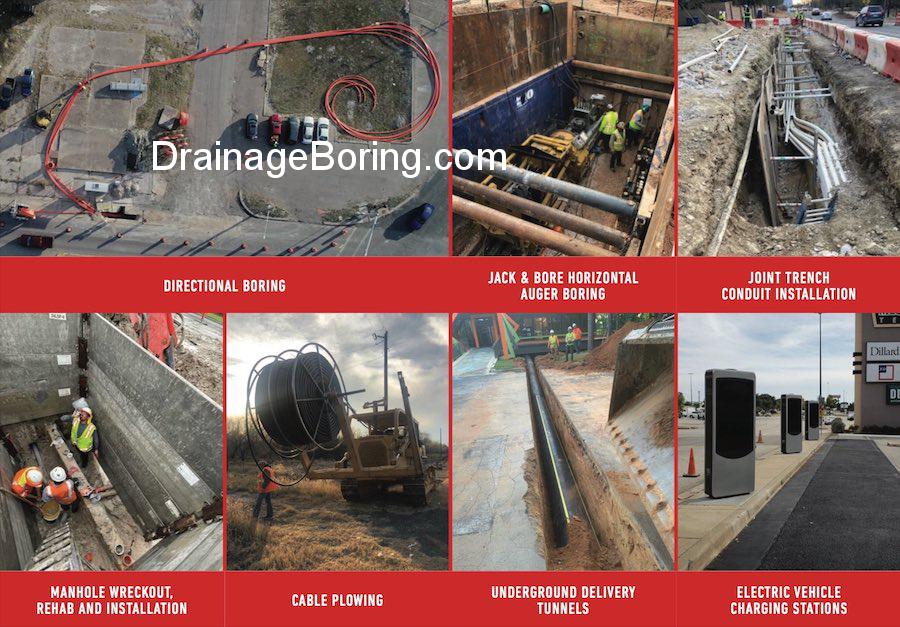Horizontal Boring
Drainage Boring - Horizontal Boring Contractors
Horizontal boring is a critical technique employed across various industries, allowing for the installation of underground utilities without disrupting the surface. Here’s how it is applied across these specific areas:
Drainage Boring - Horizontal Boring Companies
1. Horizontal Auger Boring
- Usage: Horizontal auger boring is widely used for installing pipes, conduits, and casings under roads, railways, and other obstacles.
- Method: A rotating auger inside a steel casing removes soil as the casing is jacked into place. It’s ideal for short to medium distances in stable soils.
- Applications: Sewer, water lines, and smaller-scale oil and gas pipelines.
2. Jack and Bore
- Usage: Often applied for installing larger-diameter steel casings under infrastructure like highways or railways.
- Method: A hydraulic jack pushes a casing pipe while an auger removes soil from within.
- Applications: Sewer and water mains, storm drains, and oil or gas pipelines where precision is critical.
3. Horizontal Directional Drilling (HDD)
- Usage: HDD is the go-to method for installing pipelines over longer distances and in environmentally sensitive areas.
- Method: A drill creates a pilot hole, which is then reamed to the desired diameter. Pipes are pulled through the hole.
- Applications: Fiber optic and electric cables, sewer and water lines, and oil and gas pipelines.
4. Directional Boring
- Usage: This term is often used interchangeably with HDD, particularly in smaller-scale projects.
- Method: Similar to HDD but typically involves shorter distances and smaller diameters.
- Applications: Fiber optic cables, electric lines, and irrigation systems.
5. Trenchless Technology
- Usage: Encompasses all methods of underground construction that avoid surface disruption.
- Method: Includes jack and bore, HDD, and other specialized techniques.
- Applications: Sewer rehabilitation, electric and water line replacements, and new utility installations in urban areas.
6. Electric
- Usage: Horizontal boring is used to install underground electric lines without disturbing roads or landscapes.
- Applications: High-voltage transmission lines, urban power grids, and renewable energy connections.
7. Fiber Optic
- Usage: Fiber optic cables are laid underground using HDD or smaller-scale directional boring.
- Applications: High-speed internet, telecommunications, and smart city infrastructure.
8. Sewer
- Usage: Boring methods are used to install new sewer lines or replace existing ones with minimal disruption.
- Applications: Wastewater infrastructure in urban and suburban areas.
9. Water
- Usage: Horizontal boring is essential for laying water mains and service lines under roads and rivers.
- Applications: Municipal water systems, rural water lines, and irrigation projects.
10. Oil & Gas
- Usage: Critical for pipeline installation in environmentally sensitive and hard-to-reach areas.
- Applications: Long-distance transmission pipelines, gathering lines, and offshore drilling connections.
11. Irrigation
- Usage: Horizontal boring enables the installation of water supply lines for agricultural and landscaping systems.
- Applications: Farms, golf courses, and urban irrigation systems.
Drainage Boring - Horizontal Boring Near Me
Horizontal boring methods offer a versatile, cost-effective, and minimally invasive solution for underground construction, making them indispensable across industries.
